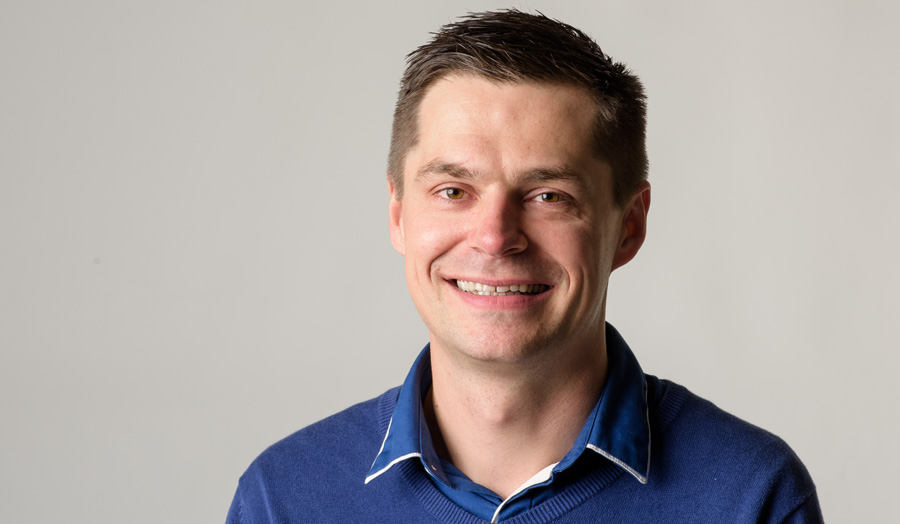Watch the interview with Daniel
Daniel Sykes, an inorganic chemistry lecturer, speaks with Funmi from our Outreach team as part of our In Conversation With series.
Funmi Ajibodun from our Outreach department caught up with Daniel Sykes to find out more about our inorganic chemistry course and what makes it so unique!
Could you tell us a little bit about yourself and what you teach?
I run the Chemistry degree here. It's a very interesting subject – we're accredited by the Royal Society of Chemistry and being involved with a professional body gives us a context to what we do with our degrees.
What is the difference between organic and inorganic chemistry?
So usually an organic chemist would use carbon in most of the things that they do as well as a number of other different elements as well, such as hydrogen, nitrogen, phosphorus, and sulphur. An inorganic chemist would focus on the whole of the periodic table, so we're not just limiting ourselves to a few elements, we probably use the whole of the range of elements in there.
What are the most challenging and enjoyable aspects of your subject for students?
The labs are the best. The joy of doing experiments and getting something correct in the lab and seeing if you get a beautiful NMR (Nuclear Magnetic Resonance), it just makes you so happy. Then what I would do is usually try and throw a metal in there and start to do some measurements. That's where it starts to get really interesting, when you get the photophysical properties or the output from a metal. Being in the lab, doing experiments and seeing that what you're doing is novel, so nobody else in the world could have potentially done that before – I think that's the best thing about the subject.
Probably the thing that people find most difficult is the maths. Getting the basics of physical chemistry involves a lot of mathematics. We run support classes and things like that to help students with that, especially if they don't have a maths qualification.
What kind of skills or attributes do students who want to study chemistry need to succeed in it?
You need to be organised, and you need to know what you're turning up for as well. You need to be ready to come to a lecture and know the topic that you're going to do and have a certain pre-knowledge of what's going to come up, so if you have any questions you can ask them. You obviously have to be organised to be in the lab, so if you're going to do some form of experiment you need to know exactly how much to weigh out, you need to know exactly what you need to do with that powder that you've weighed out and the temperature you have to heat it to. Just be ready to go, make sure that you can work safely when you're in the laboratory and then the same with lectures, be ready to ask questions and ready to do the problems that are involved.
What sort of career prospects do chemistry students have?
I'm always astounded by what people are doing outside of their degrees and where that leads them to. We've had students who've done the chemistry degree whilst also running their own science entertainment company, doing children's parties and things like that. We've had students who take a more academic route, they finish the BSc degree with us and then they go on to do a PhD. One of the first students that I met and had as a project student has just finished his PhD now, so that's really nice to see people moving on and going on to do different things.
With the analytical skills that you get you can obviously move into the chemical industry, whether that's the pharmaceutical analysis side or whether it's designing molecules on the organic chemistry side. Those analytical skills can take you into any field really, you can move into accountancy, for example, we had one student who did the chemistry degree alongside doing an accountancy qualification and she now works for a really big accountancy company. The skills you get doing a chemistry degree allow you to be analytical and to present and communicate data in a concise manner. You can go and do anything with a chemistry degree.

"The labs are the best. The joy of doing experiments and getting something correct in the lab and seeing if you get a beautiful NMR (Nuclear Magnetic Resonance), it just makes you so happy."
